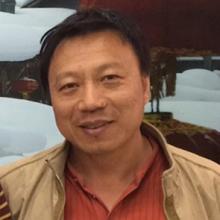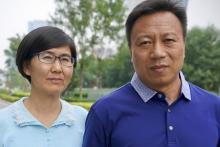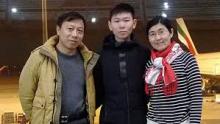This society eats people
Part One of Bao Longjun's story on disappearing into China's secret RSDL jail system
On November 1, 2019, Safeguard Defenders released the second edition of the ground-breaking book 'The People's Republic of the Disappeared' (available on Amazon worldwide as paperback and as kindle ebook). Click here to buy now. To celebrate the release of this updated and expanded book on China's use of both RSDL but also other systems and methods for enforced disappearances, we are making another victim's powerful testimony available online.
 Bao Longjun (包龙军), male, born 1970 in Inner Mongolia, is a long-time legal rights activist. He worked for the Feng Rui Law firm in Beijing with his wife, the rights lawyer Wang Yu and disappeared lawyer Wang Quanzhang. Bao was one of the first to disappear in what became known as the “709 Crackdown” against rights lawyers in the summer of 2015. He was seized at Beijing airport with his teenage son before they could board a plane to Australia, where his son was planning to attend school. That same night, security agents raided his Beijing home and abducted his wife. The couple was placed separately under Residential Surveillance at a Designated Location and remained prisoners until they were finally freed more than a year later.
Bao Longjun (包龙军), male, born 1970 in Inner Mongolia, is a long-time legal rights activist. He worked for the Feng Rui Law firm in Beijing with his wife, the rights lawyer Wang Yu and disappeared lawyer Wang Quanzhang. Bao was one of the first to disappear in what became known as the “709 Crackdown” against rights lawyers in the summer of 2015. He was seized at Beijing airport with his teenage son before they could board a plane to Australia, where his son was planning to attend school. That same night, security agents raided his Beijing home and abducted his wife. The couple was placed separately under Residential Surveillance at a Designated Location and remained prisoners until they were finally freed more than a year later.
Ye who would know what evils man can inflict upon his fellow without reluctance, hesitation, or regret; ye who would learn the limit of human endurance, and with what bitter anguish and indignant hate, the heart may swell, and yet not burst—peruse these Memoirs.
-- Richard Hildreth, The White Slave
Before the “709 Crackdown” had even begun, bad omens were already predicting trouble. A month earlier, in June 2015, an article attacking my wife, published on an unknown website from Tianjin, went viral. The article was full of lies and vulgarities maligning my wife. Following its publication, many lawyers stood up and immediately denounced it, but the authority’s intent was clear. The attack against Wang Yu had started.
I didn’t imagine things would move so fast, so intensely, or so violently as they did. They started by taking me. I had never dreamed that I would be the target of their crackdown.
On 9 July 2015, I was supposed to be taking my son, Bao Zhuoxuan, to Australia where he was enrolled in high school. Our flight from Beijing was at 1am. I still wonder if our plan to go abroad made them bring forward the start of the Crackdown.
 We had just collected our luggage from the security scanner and were heading toward the departure hall when five or six people moved in to block our way. None of them was in uniform. They asked: Are you Bao Longjun? I had barely answered yes, before they rushed forward, surrounding us. The one who had asked my name dragged me by the arm. The smell of cigarette smoke clung heavily to his body. I always associate that kind of sharp smoke smell with villains.
We had just collected our luggage from the security scanner and were heading toward the departure hall when five or six people moved in to block our way. None of them was in uniform. They asked: Are you Bao Longjun? I had barely answered yes, before they rushed forward, surrounding us. The one who had asked my name dragged me by the arm. The smell of cigarette smoke clung heavily to his body. I always associate that kind of sharp smoke smell with villains.
He produced some kind of notebook and waved it in front of my face as he explained they were from the Beijing Public Security Bureau. I only heard this much of what he said as I was being dragged away. At that moment, I only thought that we would be banned from leaving the country.
I was in shock. I turned my head and saw my young son being dragged by two of them as well, following right behind me. I was afraid he would miss his flight. I shouted: “He is just a kid! He has nothing to do with our work. His passport is in my pocket. I need to give it to him so he can go abroad for school.”
They didn’t care. We walked out of the departure hall and into chaos. I saw several police cars waiting outside, their lights flashing. Somebody was filming us. It must have looked like a scene from a movie, of a suspect being extradited from abroad.
They dragged me to an SUV, pulled a black hood over my head, and slid me into the back of the car. Two people quickly got in and sat on either side of me. By then, I understood that they were not only banning me from going abroad but that they were kidnapping me.
The car set off and we left the airport. With the black hood over my head I could only vaguely discern the pale yellow street lighting but I had no idea in what direction we were traveling. I was nervous and didn’t speak a word along the way. I had never experienced anything like this. I didn’t know what they were going to do. I was very scared.
After we drove for a long time, the car shifted onto a small road and shortly after we finally came to a stop. They pulled me out of the car. We entered a room, and my black hood was finally removed. I looked around. It was a small place, a single bed with a blue bed cover, a table with a blue tablecloth, and an armchair also covered in blue fabric. The walls were covered in white padding. There were at least three cameras monitoring the room.
People kept coming and going; one of them ordered me to take off my clothes. I removed my T-shirt obediently. “Take it all off!” he ordered harshly. I wasn’t wearing much since it was summer, and only had underwear left to remove after taking off my shorts. I looked at him meekly. “All of it!” he repeated. I was scared and immediately slid off my underwear.
He pointed to the bed, saying there were clothes there for me to wear. Lifting the sheets, I saw a few articles of clothing under the pillow: a black T-shirt, underwear, socks, and navy blue shorts. A pair of slippers had been placed by the side of the bed. I quickly got dressed. As I finished, the man spoke aggressively, “Stand against the wall. You are not allowed to move!”
 He left with my clothes. Two men entered. After moving the table to the center of the room and adjusting the two chairs beside it, one of them aggressively ordered me to stand upright. I had been leaning against the wall; I jerked my body straight. The dynamic was one of master and apprentice.
He left with my clothes. Two men entered. After moving the table to the center of the room and adjusting the two chairs beside it, one of them aggressively ordered me to stand upright. I had been leaning against the wall; I jerked my body straight. The dynamic was one of master and apprentice.
This was how my first interrogation began.
I can’t remember much about this session. I only vaguely recall talking about the injustices suffered by my family and asked them to return my son’s luggage and passport. I remember the interrogation sessions were intermittent but that they didn’t let me rest. They provided me breakfast, lunch, and dinner, but I didn’t eat.
The next day, after a full night of interrogations, I started to eat a little. The third night, during a gap in the interrogation, I couldn’t stand it any longer and I asked the two guards if I could sleep for a while. They nodded. I fell into a deep sleep.
When I woke up I could see it was bright outside. The next time I saw the interrogators their attitude was better. They appeared to show compassion for my family, the attack against my wife, and promised they would return Bao Zhuoxuan’s passport and luggage. I felt so grateful, but it was all a ruse to trick me, to lull me into a false sense of security.
They said I was under suspicion of inciting subversion of state power, and that I was being placed under Residential Surveillance at a Designated Location (RSDL). They asked me to sign my name on a notice but I refused.
Later on, another person was added to the interrogation team. He spoke with a heavy Tianjin accent. He said he was from Tianjin Public Security Bureau.
They had made a list of my confiscated belongings. I saw that my son’s luggage had been taken off that list as if to prove that they were being honest when they told me that my son was safe. They said that they had returned his stuff and that none of this would affect his ability to study abroad. It wasn’t until later that I understood it was all part of their trick.
They focused their interrogations on my interactions with more than 20 lawyers and activists. These included a Beijing workshop on Fan Mugen’s case, who was one of my wife’s clients; the Jiansanjiang incident and the dinner we had held for Wang Quanzhang’s return after he was beaten in Jiansanjiang; a training in Thailand; details about the Fengrui Law Firm, and others. I answered some questions truthfully but concealed some information so that I could avoid incriminating others.
It wasn’t until much later when I had been transferred to Tianjin and was visited by state-assigned lawyers, who I also happened to know, did I realize the full extent of what was happening.
The lawyers told me the list of those who had been detained. I was shocked. There were a few matters that my interrogators seemed the most interested in. They kept coming back to these same questions again and again.
They asked about a training I had attended in Thailand. I explained it was an IT training, and that I hadn’t really learned anything, and that I had mainly gone to have some fun. I told them that the manual was still in my laptop, and that they could find it if they wanted. They questioned me about that Thailand training several times and said they knew it had been organized by the so-called Anti-China force, Weiquanwang [Chinese Human Rights Defenders, a human rights NGO].
They asked about Fan Mugen. He was one of Wang Yu’s clients, and I was the assistant. I had attended a workshop on his case, but I didn’t know who had organized it. Other famous lawyers were there, including Li Heping. They asked me why Wang Yu had taken the case. I explained that local household owners had wanted her to represent him. His house was being illegally demolished in Suzhou and as he was trying to protect it from the demolition team he accidently killed two of them.
They also asked about Cao Shunli. I told them that Cao Shunli had died during her arbitrary detention, before Wang Yu was properly able to represent her in court. They asked me if I knew Teng Biao (Foreword), but I didn’t. They also questioned me about Ilham Tothi, another of my wife’s clients. I told them she only represented him during the investigation period, and that they had only met up a few times.
While I was being questioned, I could sense the danger my wife was facing, and so I pressed them to tell me about her condition. They told me she was fine, and even swore “on Mao’s name” that they were telling me the truth.
They thought I was honest. I didn’t resist. So they started treating me better.
I was kept in a small room with an attached bathroom. This small room was covered all over with white padding; even the sides of the toilet and sink were padded [a suicide prevention measure]. The light was on 24 hours a day. The curtain was heavy, and rarely opened.
Other than when I was being interrogated, two guards watched me 24 hours a day. Normally each team would take turns every two hours. For the first seven to eight days, they subjected me to frequent interrogations. At night, two guards watched me, even when I went to the toilet or brushed my teeth. One would stand inside the bathroom, and another by the door.
One of them had a small book in his pocket. Every 10 minutes, he would take it out and make notes. My daily routine was entirely regimented, except for the interrogations. Also, every day a medic would come and take my blood pressure.
One day, an interrogator told me they were changing my location because my room was going to be renovated. They put me back in the black hood to be transferred. The trip only took a few minutes, and they drove very slowly.
The new place was a big empty room, about 20sqm, and the walls were also covered in white padding. There were no windows. There were three or four cameras on the wall staring at me. Sometimes I could hear the sound of a camera moving. There was no toilet in the room. Each time I needed to use the toilet or brush my teeth I had to ask for permission. They would put a black hood over my head and two guards would take me to the toilet.
I often heard them speaking on walkie-talkies: “Number 2 is brushing his teeth;” “Number 2 is in interrogation,”etc. I came to realize that they were referring to me, that I was “Number 2.” Sometimes I heard them mention other numbers and from that I believe that at least four other people were being held on my floor.
One day the door opened while the guards were changing shifts. I heard the voice of [human rights lawyer] Li Heping asking for his restraints to be loosened. I assumed he was asking the guards not to drag him too roughly while he was using the toilet. I was so happy to hear him, even though we couldn’t speak; after such a long time, at least I could hear a friendly voice. Imagine it, in this place you can’t talk with anyone except your interrogators. I really hated the interrogation sessions.
Whenever I heard the sound of chairs being moved, I became instantly nervous, because I didn’t know what they would ask me and how I could answer in a way that wouldn’t hurt others.
Although I hated the interrogation sessions, if they didn’t happen for a few days, I would start to worry: Had something gone wrong? At least they were some kind of interaction, and after a few days in isolation I would hope for a chance to talk with anyone. This is what it was like. My condition? I was depressed, afraid, and lonely all the time. Each day felt like a year. Every day I dreamed about getting out of this shithole.
My interrogation sessions became less frequent once they moved me to the new location. After several days without seeing any interrogators, the interrogator from Beijing came into my room. “Old Bao,” he called out. “You are going to be fine. You will be released soon.”
A few days later he saw that I had washed my prison clothes and was drying them on the interrogation table. He asked me: “Why are you washing these clothes? You are going back home soon.” These words became my hope. I was ecstatic at the thought of release, to be reunited with my son and wife. But day after day, a whole month passed, and there was no sign that I would be released. Finally, after one interrogation session I asked: “Didn’t you say I would be released soon?” “The leader didn’t agree to your release. What can I do?”
I was destroyed. In the following days, I would pace my cell, the guards standing a distance apart, demarcating the limits of my freedom. As I walked between them, I thought about that line from Notes from the Gallows by Julius Fuchik. “Seven steps from the door to the window, seven steps from the window to the door.” But, unlike Fuchik, I wasn’t allowed to reach the door, or the window. I could only walk back and forth between the two guards.
Every day, I spent long hours walking like this. I was like a wolf in a cage, but I couldn’t howl like a wolf, because I wasn’t allowed to make a sound. If even the smallest whisper came from my lips as I recited poetry, as I often did to myself in times of extreme boredom, they would stop and reprimand me. “You’re not allowed to move your lips,” they would say.
You can read the second part of Bao Longjun's story here.
The latest updated second edition of The People's Republic of the Disappeared is available on Amazon worldwide.
